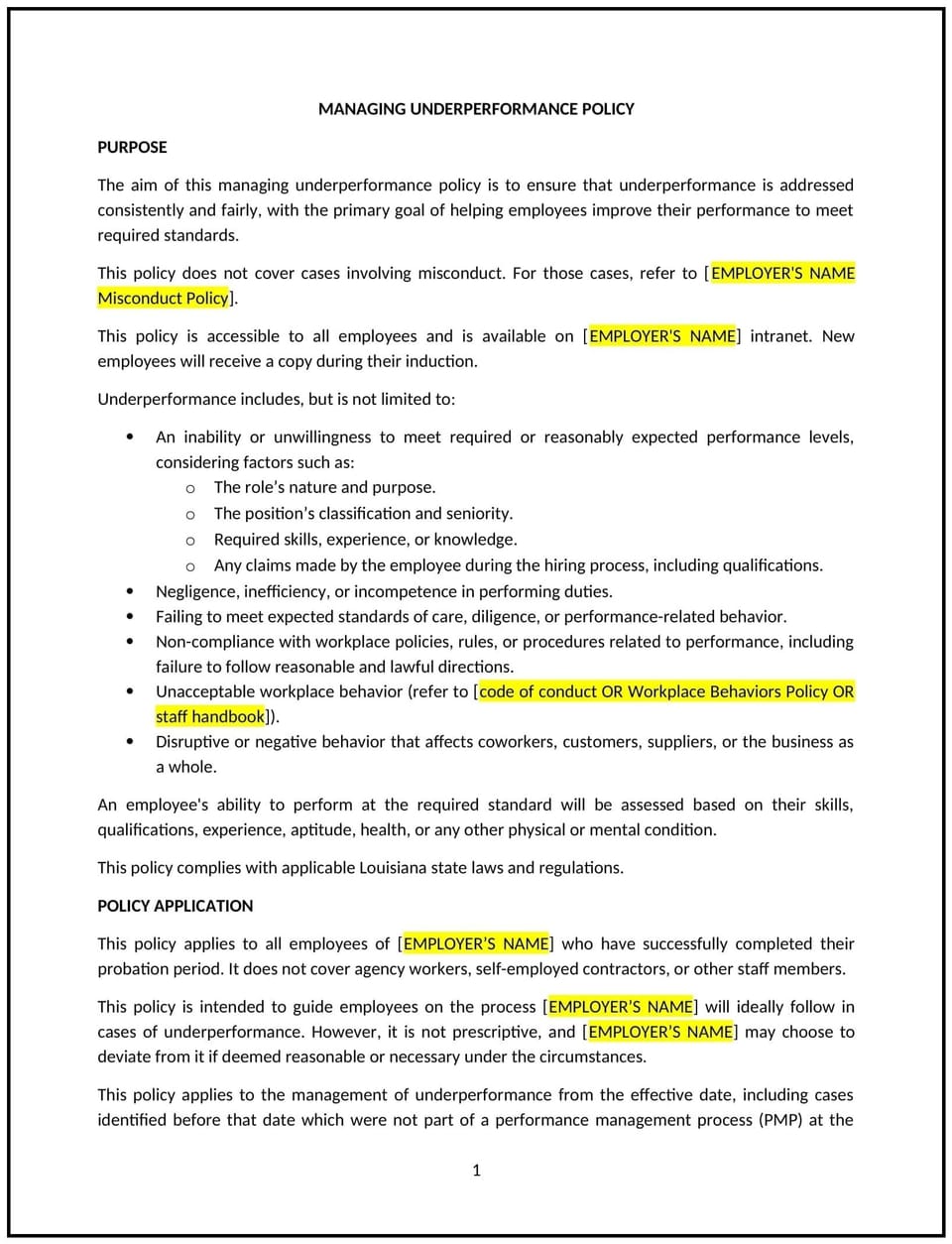Managing underperformance policy (Louisiana): Free template

Managing underperformance policy (Louisiana)
This managing underperformance policy is designed to help Louisiana businesses address and improve employee performance issues effectively. It outlines procedures for identifying, documenting, and addressing underperformance while providing support and opportunities for improvement.
By implementing this policy, businesses can foster accountability, enhance employee productivity, and promote a positive workplace culture.
How to use this managing underperformance policy (Louisiana)
- Define underperformance: Clearly describe what constitutes underperformance, such as failure to meet objectives, poor quality of work, or lack of engagement.
- Establish identification procedures: Detail how managers can identify and document instances of underperformance through observation, metrics, or feedback.
- Outline support measures: Provide steps for offering support, such as coaching, training, or mentoring, to help employees address performance gaps.
- Include performance improvement plans (PIPs): Specify how to create and implement structured PIPs with clear goals, timelines, and expectations.
- Communicate consequences: Detail potential outcomes for unresolved underperformance, such as reassignment, demotion, or termination.
- Encourage regular feedback: Promote ongoing communication between managers and employees to address issues proactively.
Benefits of using a managing underperformance policy (Louisiana)
Implementing this policy provides several advantages for Louisiana businesses:
- Enhances accountability: Encourages employees to take ownership of their performance and development.
- Promotes fairness: Establishes consistent procedures for addressing performance issues across the organization.
- Reduces turnover: Offers support and resources to help employees succeed rather than resorting to immediate termination.
- Improves productivity: Identifies and resolves performance issues promptly to maintain operational efficiency.
- Reflects Louisiana-specific practices: Adapts to local workplace dynamics and cultural considerations.
Tips for using this managing underperformance policy (Louisiana)
- Document thoroughly: Keep detailed records of performance issues, conversations, and improvement plans to ensure transparency and consistency.
- Train managers: Equip supervisors with the skills to identify, address, and resolve performance issues constructively.
- Set realistic goals: Ensure performance improvement plans include achievable objectives and clear expectations.
- Foster a supportive environment: Encourage open dialogue between managers and employees to build trust and facilitate improvement.
- Review periodically: Update the policy to reflect changes in workplace practices or Louisiana-specific needs.
Q: What is considered underperformance under this policy?
A: Underperformance includes failing to meet established goals, producing substandard work, or demonstrating behaviors that negatively impact the team or business.
Q: How should managers address underperformance?
A: Managers should document the issue, meet with the employee to discuss concerns, and provide resources or guidance to support improvement.
Q: What is a performance improvement plan (PIP)?
A: A PIP is a structured document that outlines specific performance goals, timelines, and actions required to address underperformance.
Q: What support can businesses offer employees to improve performance?
A: Businesses can offer training, coaching, mentorship, or adjusted workloads to help employees address performance gaps.
Q: What happens if an employee fails to improve after a PIP?
A: If improvement is not achieved, potential outcomes may include reassignment, demotion, or termination, depending on the severity of the issue.
Q: How often should this policy be reviewed?
A: The policy should be reviewed annually or when workplace practices or Louisiana-specific considerations evolve.
Q: How can businesses ensure fairness when addressing underperformance?
A: Businesses can ensure fairness by applying the policy consistently, documenting all steps, and involving HR or neutral parties when necessary.
This article contains general legal information and does not contain legal advice. Cobrief is not a law firm or a substitute for an attorney or law firm. The law is complex and changes often. For legal advice, please ask a lawyer.


